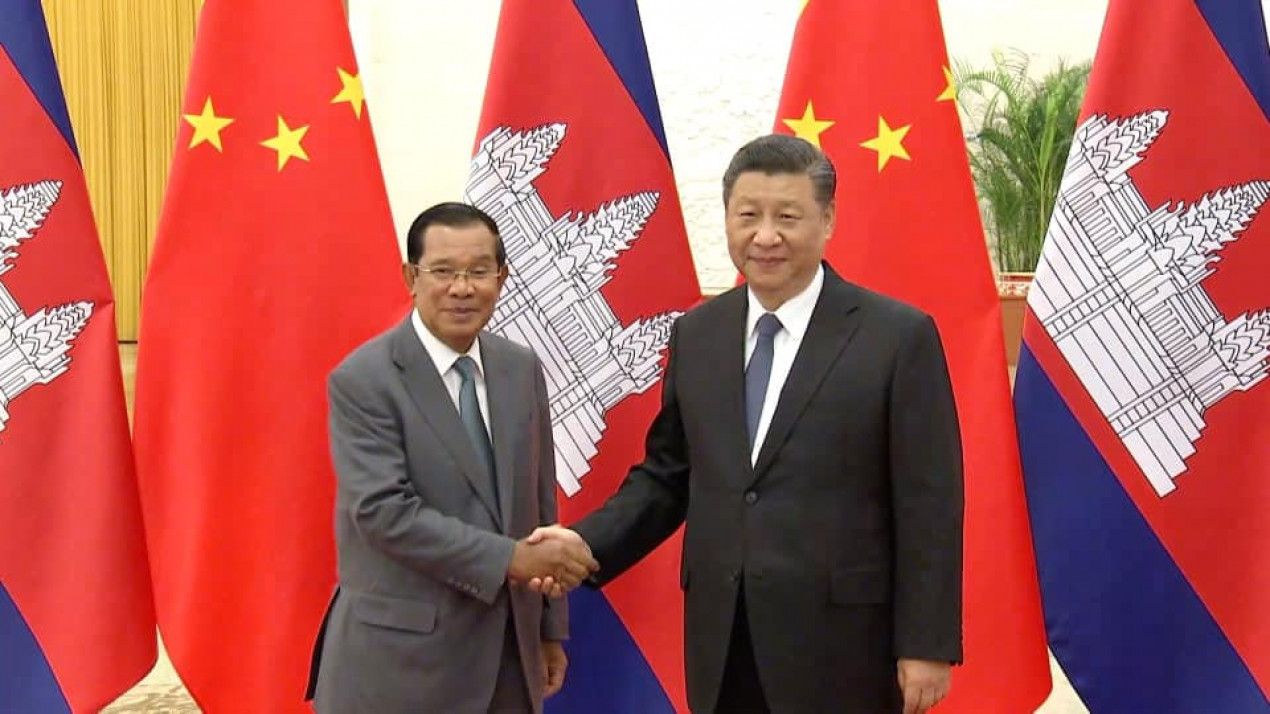
Cambodia’s Foreign Policy in the Regional Politics

Written by: Phengly Sopha, 4-year student majoring in International Relations at Paññāsāstra University of Cambodia and Research Intern at Cambodia Development Center
Edited by: Dr. Heng Kimkong, Co-founder and Editor-in-Chief of the Cambodian Education Forum and Visiting Senior Research Fellow at the Cambodia Development Center

(Photo Credit: This photo was posted on the Facebook page of Prime Minister Hun Sen on February 5, 2021)
Following the creation of the Kingdom of Cambodia after the long and chronic civil war, including the Khmer rouge regime, Cambodia opened up, becoming a full member of the Association of Southeast Asia Nations (ASEAN) on 30 April 1999. It then implemented its own “open door strategy” to welcome and integrate its economic liberalization, regionally and globally. Unfortunately, Cambodia has faced many challenges, particularly regarding its regional choices that are often criticized by countries in the region and the world. For example, Cambodia was harshly criticized when it was an ASEAN chair in 2012. The former Cambodia Foreign Minister, Hor Namhong, told his colleagues that “the ASEAN meeting is not a court” and requested the joint communique to not mention the maritime disputes. Moving forward, Cambodia must craft its foreign policy approaches by maintaining its neutral foreign policy and employing public diplomacy, preventive diplomacy, and hedging strategy.
Firstly, Cambodia's foreign policy of neutrality was declared by the late King Norodom Sihanouk during his reign from 1950 to 1970, commonly known as the “Sangkum Reastr Niyum”. After the national election, monitored by United National Transitional Authority in Cambodia (UNTAC) in 1993, the Constitution of the Kingdom of Cambodia promulgated the “neutrality policy” in Article 53. This means non-alignment with foreign countries, except for the UN peacebuilding operation, and an acceptance of all militarized support for self-defense. Therefore, it is vital for Cambodia to maintain its neutral policy to expand its international network and promote national interests.
Many countries have recently criticized Cambodia for being pro-China and urged the Royal Government of Cambodia (RGC) to be neutral and independent. In response, the RGC often states that it never abandons any foreign friends, always welcomes all states to join military exercises, and opens doors for every country willing to collaborate in all sectors, including social, economic, and political sectors. For instance, Cambodia allowed the U.S. military personnel to visit Ream Naval Base, following the accusation that Cambodia allowed China to use the base for military purposes.
Secondly, public diplomacy can help Cambodia to promote its reputation on the regional and international stage. In international relations, “public diplomacy” is a tool used by states to influence other states. In broader terms, it is an instrumentalization for states to gain their soft power and enhance their attraction and reputation abroad. In other words, public diplomacy is the strategy for states to gather all relevant stakeholders and institutions to publicly discuss any issue with mutual respect and in a peaceful manner. For instance, the 13 Asia-EU Meeting (ASEM) in 2020, under the theme; “Strengthening the Multilateralism for Shared Growth” reflected Cambodia’s public diplomacy strategy to gather all ASEM members virtually at the meeting with fruitful discussions and essential outcomes for mutual interests.
Thirdly, being blamed and criticized by some countries, especially by great powers such as the United States, Cambodia somehow lost its face on the international stage. In between great powers, Cambodia plays a crucial role in maintaining peace, security, and stability in the region as well as promoting the international role-based order. In light of this, Cambodia must have strong leadership and adhere to “preventive diplomacy” (measures that a state used to prevent any conflict escalation) to build trust and mutual understanding between the great powers and other regional member states. The ASEAN Regional Forum and the ASEAM Foreign Ministerial Meeting hosted physically by Cambodia have marked the great success of using preventive diplomacy unlike what happened during Cambodia’s ASEAN Chairmanship in 2012.
Finally, while public and preventive diplomacy is the key to successfully negotiating and reducing tensions between great powers in the region, a “hedging strategy” which is the strategy that a state uses to avoid direct confrontation with another big state in international relations and in a mixed cooperative manner is used. In this sense, Cambodia needs to have a flexible strategy to balance the gains and losses from great power competition. In the meantime, Cambodia can escape any persecution and sanctions imposed by other states. For instance, the RCG always mentions that Cambodia leaves doors open for all nations, and investors can come to run businesses freely as long as they respect the investment law and other Cambodian laws. At the same time, Cambodia's foreign policy is favorable to China to secure its national security and interests, including additional economic agreements such as the Free Trade Agreement (FTA) and the Regional Comprehensive Economic Partnership (RCEP).
To this end, Cambodia more or less will receive criticism from great powers and other counties in terms of its choices to engage closely with China. It is sometimes problematic for Cambodia to achieve its regional interests. Therefore, adhering to the principle of neutrality as its core value of the foreign policy is the best solution to deal with regional challenges. As a small state, Cambodia cannot stay alone without any cooperation, engagement, and competition with others. Thus, a freely open-door strategy to welcome all states is a must for maximizing Cambodia’s social, economic, and political interests.
* This blog is produced with the financial support from the European Union and The Swedish International Development Cooperation Agency through Transparency International Cambodia and ActionAid Cambodia. Its contents do not reflect the views of any donors.




